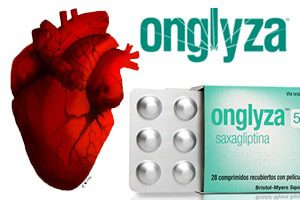
Bristol-Myers Squibb just announced data presented on the relationship between its Type 2 diabetes drug Onglyza (saxagliptin) and heart failure-related hospitalizations. The information was part of a study that revealed that Onglyza was not associated with increased risks for cardiovascular death, non-fatal heart attack, or nonfatal stroke. The research did find that Onglyza was tied […]
 Bristol-Myers Squibb just announced data presented on the relationship between its Type 2 diabetes drug Onglyza (saxagliptin) and heart failure-related hospitalizations.
Bristol-Myers Squibb just announced data presented on the relationship between its Type 2 diabetes drug Onglyza (saxagliptin) and heart failure-related hospitalizations.
The information was part of a study that revealed that Onglyza was not associated with increased risks for cardiovascular death, non-fatal heart attack, or nonfatal stroke. The research did find that Onglyza was tied to increased rates for heart attack due to heart failure. According to AdverseEvents.com. When heart failure occurs, the heart does not properly pump blood to the body, which may be caused by heart attack, high blood pressure, cardiovascular disease, obesity, diabetes, and cigarette smoking.
According to AdversEevents.com, the study involved 16,492 patients who were diagnosed with a high risk for cardiovascular events and Type 2 diabetes. Patients were treated with either Onglyza or placebo. Onglyza is manufactured jointly by Bristol-Myers Squibb and AstraZeneca, and was approved by the U.S. Food and Drug Administration on July 31, 2009.
The research—the Saxagliptin Assessment of Vascular Outcomes Recorded in Patients with Diabetes Mellitus (SAVOR) study—Involved FAERS data from November 01, 1997 to December 31, 2012; data was aggregated and standardized by the AdverseEvent RxFilter process and revealed 2,527 serious adverse events, which listed Onglyza as a suspect drug. Of these, 1,888 listed Onglyza as the primary suspect, according to AdverseEvents.com. The researchers identified 359 hospitalizations and 52 patient deaths in which Onglyza was indicated as the primary suspect. The most common side effects were rash, pancreatitis, and nausea. Pancreatitis is a known precursor to pancreatic cancer.
Onglyza is in the drug class of GLP-1-based diabetes therapies, which are also known as incretin mimetics. Incretin mimetics include Byetta and Bydureon (exenatide); Victoza (liraglutide); Januvia, Janumet, Janumet XR, and Juvisync (sitagliptin); Onglyza and Kombiglyze XR (saxagliptin); Nesina, Kazano, and Oseni (alogliptin); and Tradjenta and Jentadueto (linagliptin). Incretin mimetics include natural substances that lower raised blood sugar levels and are used in patients diagnosed with abnormally low insulin levels or patients whose bodies do not utilize insulin efficiently. Incretin mimetics imitate the body’s incretin hormones, which stimulate the release of insulin after meal consumption.
The study was led by the TIMI Study Group and Hadassah University Medical Center and involved more than 700 sites worldwide, SAVOR was a randomized, double-blind, placebo-controlled trial of 16,492 patients designed to evaluate the cardiovascular safety and efficacy of Onglyza in adults diagnosed with Type 2 diabetes who were at risk for cardiovascular death, heart attack and stroke.
“Given the correlation between diabetes and cardiovascular complications, there is a need for thorough assessments of the cardiovascular risks among therapies that improve glycemic control,” said Deepak L. Bhatt, MD, MPH, Senior Investigator of the TIMI Study Group, Brigham and Women’s Hospital, and a Principal Investigator for the trial.
As we’ve written, a recently published piece in the journal BMJ, revealed that incretin mimetics might be riskier than first thought. The report also indicated that drug makers have withheld data on the potentially dangerous effects of incretin mimetics. After analyzing thousands of pages of regulatory documents it obtained under Freedom of Information rules, BMJ located unpublished data that indicated “unwanted proliferative or inflammatory pancreatic effects,” associated with use of incretin mimetics.
A study published March 22, 2013 in the journal, Diabetes, revealed abnormal changes, such as precancerous lesions, in the pancreases of eight organ donors who had taken GLP-1-based medications when compared with patients who took other diabetes medications, according to Medscape Medical News.Study: Type 2 Diabetes Drug, Onglyza, Tied To Increased Heart Failure-Related Hospitalizations


